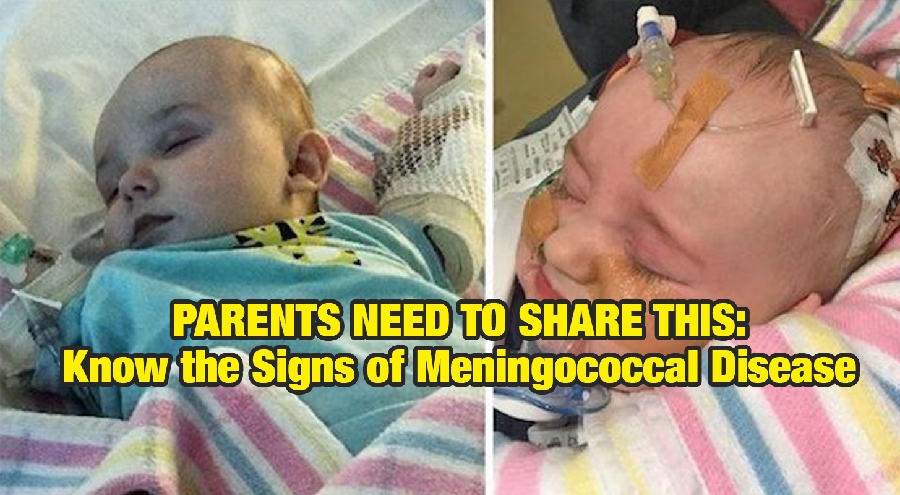- Study Says Most Parents Don’t Use Car Seats In Ride Share Vehicles Like Uber
- This 12-Year-Old Boy Is A Sophomore Aerospace Engineering Major!
- Fire Safety Experts Warn Of Hand Sanitizer Danger After A Mom and Kids Escape House Fire
- Recall Alert: Peaches May Be The Cause Of Salmonella Outbreak, 68 People Ill
- Summer Vacation In The Days Of COVID: Tips To Stay Safe
- How To Safely Grocery Shop During The Coronavirus Pandemic
- Michigan Teen With Vape-Related Illness Undergoes Double Lung Transplant
- Teen Kicks Off Anti-Vaping Campaign From Hospital Bed
- Teenager Receives Life Sentence For Strangling Sister To Death Over A Wi-Fi Password
- Toddler Falls To Death From 11th Deck of Cruise Ship
Parents Have To Know the Signs of Meningococcal Disease and Trust Your Motherly Instincts


Brock Morschel had a bad cold. When his temperature spiked to 39C his mother Tegan-Lee Gilbert rushed him to the hospital.
Parents Have To Know the Signs of Meningococcal Disease and Trust Your Motherly Instincts
Tegan-Lee knew something wasn’t right.
This wasn’t an ‘ordinary cold’ and her instincts told her that her four-month-old son needed urgent medical attention. Unfortunately, it took three visits to the hospital emergency department before a doctor identified that her baby was suffering from bacterial meningitis. Meningitis is a serious condition that occurs when the membranes that surround the brain and spinal cord become inflamed.
Baby Brock was finally admitted to hospital when a doctor trusted Tegan-Lee’s instincts. “He said to me, “Does he look like your son – like how he usually does?” and I said “no”, and that’s when he said “well, mum knows best”.
Mum Does Know Best
As a parent, you know your own child. Combined with the right information, your instinct is the very best tool for keeping your children protected and safe. When it comes to childhood health and diseases – knowledge is your superpower.
This is why it’s so important for every parent to understand the warning signs of potential health risks – especially hard to identify diseases like meningococcal disease (which can cause bacterial meningitis or septicemia).
Unfortunately, only one in three parents are aware of the facts surrounding meningococcal disease [i] and whilst a rare disease, it strikes quickly and with little warning. If left untreated, meningococcal disease can be potentially devastating.
What is Meningococcal Disease?
Meningococcal disease is a rare but potentially life-threatening bacterial infection. We generally hear about it in the media and most often when a child is affected – just like baby Brock.
Meningococcal disease presents initially just like a common cold or fever. That’s why as parents it’s critical to understand the disease and if you’re ever in doubt speak to your family doctor for advice.
Know the Symptoms of Meningococcal Disease
Early recognition and treatment of meningococcal disease offers the best chance of recovery.
Early symptoms can include:
- High fever
- Refusal to eat
- Difficulty waking or extreme tiredness
- High-pitched or moaning cry
- Vomiting and diarrhoea
- Pale, grey or blotchy skin
- Sensitivity to light
- Cold hands and feet
- In infants, a bulging fontanelle (the soft spot on top of the head)
You Know Your Child – So Know When to Seek Help
As a parent, nobody knows your child better than you! If you’re concerned about their health, be sure to monitor for signs and symptoms as listed above.
Remember to always seek advice from your GP or healthcare professional if your child’s condition continues or gets worse. Alternatively, a visit to your local hospital’s emergency department can also be another way to get prompt attention if you are unsure and suspect it could be meningococcal disease.
Remember as a parent to follow your instincts. Many parents of children affected by meningococcal disease have later said they knew that something ‘just wasn’t right’. Much like Tegan-Lee and baby Brock’s case, ‘Mum knows best!’
Know Exactly What Your Child is Vaccinated Against
There are three different types of the meningococcal bacteria that cause the majority of meningococcal disease in Australia. Most parents are unaware there are multiple strains [i].
While most parents follow the routine childhood vaccinations, many do not know that there are other strains of meningococcal disease to protect against. Even with their routine vaccinations being up-to-date, your child may still be at risk from other strains of meningococcal disease.
Whilst routine childhood vaccinations protect against one type of meningococcal disease, the KnowMeningococcal campaign urges parents to be fully aware of the options when it comes to the health of their family.

Key Facts: Meningococcal Disease – What Every Parents Needs to Know
Get to know the symptoms: The quicker meningococcal disease is treated the less severe the possible impact.
You know your child: If you suspect meningococcal disease it is imperative to act immediately.
Know what your child is vaccinated against: There are multiple strains of meningococcal disease. Not all vaccinations protecting against these strains are included in the routine childhood immunisation schedule for children. To help protect against other strains of meningococcal disease speak to your GP.








0 comments